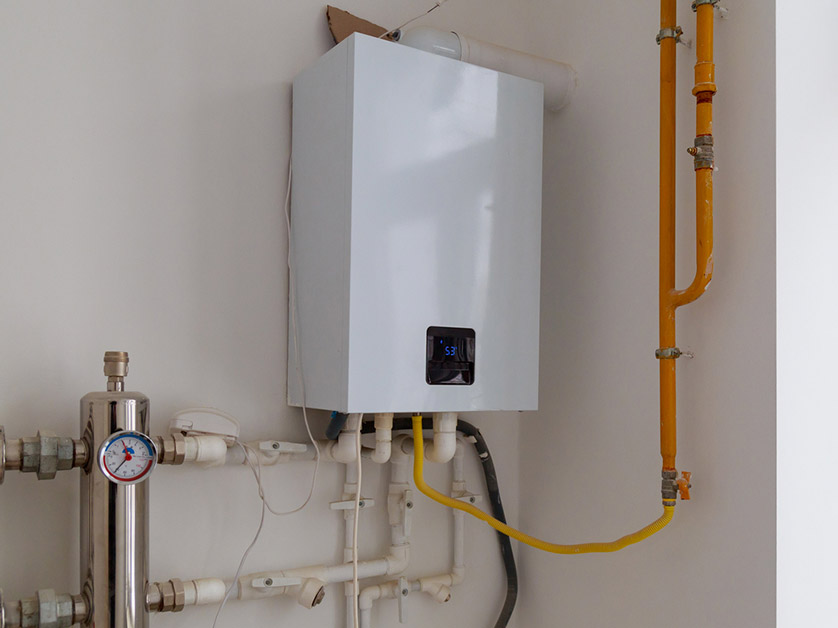Maximizing Home Comfort: The Benefits Of Tankless Water Heaters
Maximizing Home Comfort: The Benefits Of Tankless Water Heaters
Blog Article
How do you actually feel on the subject of Why You Should Consider a Tankless Water Heater?

In a globe where benefit and performance reign supreme, it's no surprise that homeowners are frequently in search of smarter methods to handle their home's power usage and convenience. One development that has actually continuously obtained popularity is the tankless water heater. Yet exactly what makes these systems stand apart from the conventional tank-based models a lot of us matured with? Let's dive in and discover the advantages of tankless water heaters, aiding you determine if it's time to make the switch in your home.
Intro
Picture this: you step into the shower after a lengthy day, expecting a calming waterfall of warm water, just to be welcomed by icy beads because the last individual used everything up. Sound acquainted? Typical hot water heater keep a fixed amount of hot water, indicating you're at the mercy of that container's supply. Tankless systems, on the other hand, warm water on demand. No more going out mid-shower, say goodbye to wrestling with schedules simply to make sure warm water is offered.
Comprehending Tankless Water Heaters
What Are Tankless Water Heaters?
Tankless hot water heater, in some cases called on-demand or instantaneous water heaters, supply warm water just as it's needed. Rather than keeping gallons of pre-heated water, these devices kick right into activity the minute you turn on the tap. Water travels through a warmth exchanger, warming up in real-time, indicating you obtain a nonstop flow of hot water without the need for a huge storage tank resting idly by.
Just how Do They Differ from Typical Systems?
Typical heating systems hold a tank of warm water, making use of energy to maintain that tank at a consistent temperature. Tankless devices remove the standing supply, reducing lost power and the cumbersome impact of a big cylinder. Basically, you're updating from a "stockpile" attitude to a "made-to-order" strategy.
Usual Kinds Of Tankless Units
Tankless hot water heater usually are available in two ranges: gas and electric. Gas versions have a tendency to supply greater circulation rates, suitable for bigger houses, while electrical versions usually serve smaller sized homes and are normally simpler to install. Additionally, some systems are designed for point-of-use (serving one component) while others can handle the whole home's warm water demands.
Secret Advantages of Tankless Hot Water Heater
Power Performance and Price Savings
Say goodbye to heating a titan tank's worth of water and maintaining it cozy throughout the day. Tankless heating systems lower standby power losses, which can reduce utility bills. While the initial expense may be greater, the long-term savings usually justify the financial investment.
3. Space-Saving Layout
If your home is short on storage space, getting rid of the large tank frees up useful space. Tankless devices are small and can frequently be installed on wall surfaces, concealed in corners, or installed in tight utility wardrobes without gobbling up the whole space.
4. Longer Life expectancy
A properly maintained tankless water heater can outlive its tank-based relative. Traditional tanks could last 10-15 years, while tankless versions can maintain downing along for twenty years or more, making them a solid financial investment gradually.
1. Countless Warm Water Supply
Ever needed to set up showers so everybody gets their fair share of hot water? With tankless, that ends up being a thing of the past. As long as the heating unit's flow ability isn't gone beyond, you can take back-to-back showers without becoming a popsicle.
5. Improved Water Quality
Keeping water in a storage tank can sometimes bring about sediment buildup or a slightly "off" preference. With tankless systems, fresh water is warmed on the spot, lowering the possibilities of debris buildup and potentially using cleaner-tasting water.
Factors to consider Before Switching
Though the benefits are engaging, it's smart to consider a couple of elements prior to fully dedicating.
Evaluating Your Home's Water Usage Patterns
If your house concurrently makes use of multiple components with high hot water demand, ensure the system's circulation rate satisfies your demands. Recognizing your use patterns assists you pick the appropriate dimension and sort of tankless heater.
Maintenance and Care Tips
Tankless systems are reasonably low maintenance, however they aren't set-it-and-forget-it appliances.
Regular Cleansing and Descaling
Difficult water minerals can accumulate in the warm exchanger, influencing effectiveness. Regular descaling (often advised yearly) maintains the device running at peak performance.
Annual Specialist Evaluations
A yearly checkup from an expert makes certain minor problems are caught early. They'll analyze the system's efficiency, try to find leaks, and help maintain optimum efficiency.
Preliminary Investment Expenses
Tankless heaters generally feature a greater ahead of time price tag. Between the system itself and prospective installment adjustments, the preliminary price could give you sticker label shock. Yet bear in mind to see it as a long-term investment.
Installment Requirements
Depending on your home's infrastructure, you could need added electric capability or gas line upgrades. Ensure you comprehend the installment demands and seek advice from an expert to prevent surprises.
Making Sure Correct Air Flow
For gas designs, proper ventilation is vital to securely eliminate exhaust gases. Make certain venting systems are tidy and correctly set up to avoid any kind of potential safety dangers.
Comparing Different Brands and Models
Not all tankless water heaters are produced equivalent.
Researching Trusted Manufacturers
Search for credible brand names with a history of producing high quality devices. A dependable manufacturer typically supplies far better customer assistance and longer service warranties.
Installment: DIY or Expert?
While some house owners relish dealing with tasks themselves, tankless setup might not be the best time to break out the toolbox.
Pros and Cons of DIY Setup
A DIY install can save money, yet it includes dangers. Inaccurate installation can lead to inadequacy or safety and security problems. If you come in handy and have experience, it may be possible-- yet wage caution.
Checking Out Testimonials and Customer Comments
Individual reviews and feedback from next-door neighbors or friends that have gone tankless can supply useful insights. Sometimes, real-life experiences can be a lot more telling than advertising and marketing sales brochures.
When to Call a Specialist Plumbing Technician
For many, calling a professional guarantees every little thing's done correctly. A professional plumbing professional understands local codes, sizing demands, and venting specifications, reducing the threat of mishaps.
Making the most of Efficiency
You have actually purchased a tankless device-- now maximize its effectiveness.
Optimum Temperature Level Settings
Most people set their units in between 120-140 F. Adjusting the temperature can improve convenience and financial savings. Experiment to discover a wonderful spot that does not throw away power.
Pairing with Low-Flow Fixtures
Want to extend your system's capabilities? Take into consideration setting up low-flow showerheads and taps. They minimize water usage, allowing your tankless system to provide a constant stream of warm water without straining.
Ecological Influence
Tankless hot water heater straighten with greener living objectives.
Reduced Carbon Footprint
By using less power and just heating water as needed, tankless systems can decrease your home's carbon impact, decreasing your ecological influence.
Preserving Natural Resources
Much less power usage and less thrown away hot water translate right into less natural deposits being used, an environmental win-win.
That Profits The Majority Of from Tankless Heaters?
The charm of tankless heating systems is that they can match a selection of households.
Large Families vs. Solitary Owners
Huge households could enjoy the limitless hot water supply, while single owners value the energy cost savings from not heating an entire container for just someone's morning shower.
Property Owners with Restricted Room
If your home is short on square video, shedding the large container liberates area for other essentials-- or perhaps just much more elbow room.
Eco-Conscious Customers
Going tankless aligns with eco-friendly values, guaranteeing you're not losing power or sources.
Future Patterns in Tankless Water Heaters
The world of home devices is ever-evolving, and tankless hot water heater are no exemption.
Improvements in Innovation
R&D is constantly enhancing warmth exchangers, making units a lot more reliable and durable. Future versions might be also quieter, more portable, and much better suited for varying environments.
Smart Home Integration
Envision readjusting your water heater's temperature through an app or getting maintenance informs on your phone. As smart home tech developments, we'll see more connection and comfort.
Conclusion
Selecting a tankless water heater is greater than simply upgrading your home's warm water system; it's purchasing long-lasting comfort, power performance, and a greener lifestyle. By considering your household's water usage, bearing in mind setup demands, and devoting to routine maintenance, you can take pleasure in a consistent stream of hot water without the baggage of a bulky container. As innovation advances, you can eagerly anticipate even smarter, extra reliable tankless options that not only make your life simpler yet likewise profit the planet.
Why You Should Consider a Tankless Water Heater for Your Home
Energy Efficiency and Cost Savings
Tankless water heaters, also known as on-demand water heaters, heat water only when needed. This means they don't waste energy keeping a tank of water hot constantly. This efficiency translates into substantial cost savings on your monthly energy bills.
Endless Hot Water Supply
One of the significant advantages of tankless water heaters is their ability to provide a continuous supply of hot water. Traditional tank water heaters have a limited capacity and can run out of hot water, especially during peak usage times. In contrast, tankless water heaters can provide an endless stream of hot water, making them ideal for larger families or homes with high water usage.
Space-Saving Design
Tankless water heaters are compact and take up significantly less space compared to traditional tank heaters. They can be installed on walls, under cabinets, or even outside, freeing up valuable space in your home. This makes tankless water heaters a great option for smaller homes or properties with limited space for a traditional water heater.
Longer Lifespan and Lower Maintenance
Tankless water heaters typically have a longer lifespan compared to traditional tank heaters. They can last up to 20 years or more with proper maintenance. Additionally, tankless systems are designed with replaceable parts, which can extend their lifespan further and reduce long-term maintenance costs.
Environmentally Friendly
Reducing energy consumption not only saves you money but also benefits the environment. Tankless water heaters contribute to a smaller carbon footprint by using less energy to heat water. Their energy efficiency and ability to minimize standby heat loss make them an eco-friendly choice for environmentally conscious homeowners.
Customized Temperature Control
Tankless water heaters offer precise temperature control, allowing you to set the desired temperature to meet your specific needs. This level of customization ensures you always have water at the perfect temperature for your comfort and usage requirements.
https://beantownservices.com/blog/consider-tankless-water-heater-for-your-home

I ran across that blog post on 5 Benefits of Tankless Water Heaters while exploring the web. Are you aware of somebody who is curious about the niche? Feel free to share it. Thanks so much for going through it.
Get Quote Report this page